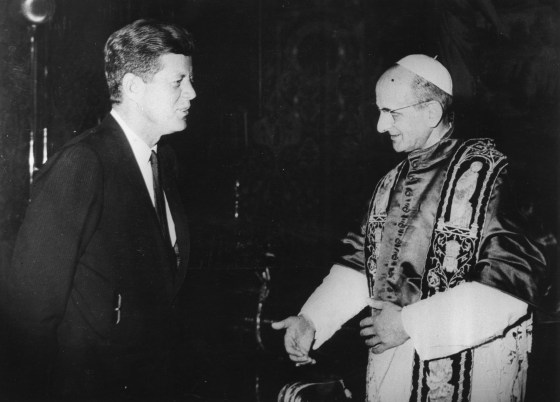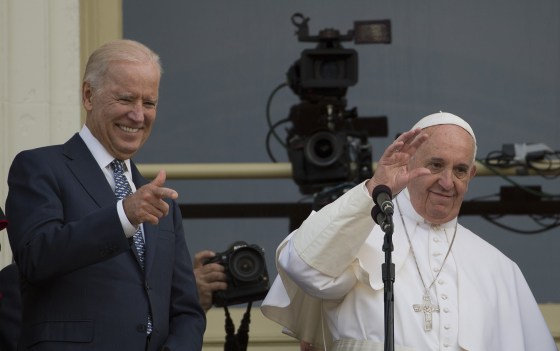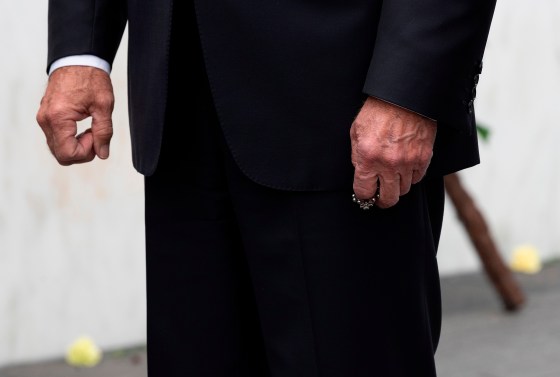New top story from Time: Joe Biden’s Presidency Has Highlighted the Rifts in the American Catholic Church
The hymns of the Catholic Church have been the soundtrack to Joe Biden’s life. He attends Mass on Sundays and holy days, and before major events. In Oval Office meetings, Biden sometimes pulls from his pocket a string of rosary beads that belonged to his late son Beau; in quieter moments, Biden will walk his fingers down the beads while saying the holy rosary, a series of meditative prayers. The day the 2020 election was called for Biden, just before he and his family greeted a cheering crowd in Wilmington, Del., a Catholic priest was asked to call in over Zoom to pray with the President-elect and his family. They bowed their heads to the prayer of St. Francis: “Lord, make me an instrument of your peace; where there is hatred, let me sow love.”
While Biden’s faith is deeply felt, his election has exposed divisions at the highest levels of the Catholic Church. Within days of his victory, 10 of the nation’s most powerful bishops took the extraordinary step of launching a “working group” on how to approach a Catholic President like Joe Biden. The panel met twice over Zoom, in December and January. Led by Archbishop Allen Vigneron of Detroit, it included New York’s Cardinal Timothy Dolan, who offered prayers at President Trump’s 2017 Inauguration, the 2020 Republican National Convention and both parties’ conventions in 2012, as well as San Francisco’s Archbishop Salvatore Cordileone and Archbishop Joseph Naumann of Kansas City, Kans., both of whom have suggested Biden should be denied the sacred rite of Communion for his stance on abortion. On the table in the discussions, according to three Catholic officials familiar with the group’s work, were the questions of how to respond to Biden’s policies that conflict with Catholic teaching and, according to one, “how to save Biden’s soul.”
Biden’s election comes at a complicated moment for the Catholic Church in America, which continues to reckon with a sexual-abuse scandal (and subsequent cover-up) that has caused widespread disenchantment with the institution. On one hand, Biden’s ascension is a capstone of the faith’s march to political acceptance. The nation’s second Catholic President oversees a government with unprecedented representation for the church. Six of nine Supreme Court Justices are Catholic, as well as the Speaker of the House, at least eight Cabinet secretaries and multiple other members of the Administration. One-fifth of all votes in the 2020 election were cast by Catholics, roughly half of them for Biden.
While Biden campaigned on some key policies the church favors—including advancing racial justice, ending the death penalty, addressing climate change and aiding refugees—he also advocates policies out of step with Catholic doctrine, such as expanding access to reproductive health care and increasing gay and transgender rights. For many top bishops and conservative voters, Biden embodies a more liberal version of the faith that poses a threat to the future of the church in America. His election “exposes a divide among American Catholics that’s been there for a long time,” says Maureen O’Connell, a religion professor at La Salle University. “There’s a big chasm, a growing chasm.”
The day Biden was inaugurated, L.A. Archbishop José Gomez, head of the U.S. Conference of Catholic Bishops, released a statement saying some of Biden’s positions “advance moral evils.” Other church leaders felt Gomez went too far. Cardinal Wilton Gregory, who oversees the churches Biden worships at in Washington, said Gomez’s comments were “ill-timed.” Chicago Cardinal Blase Cupich, who has close ties to Pope Francis, described the statement as “ill-considered.”
The schism affects all Americans. In a deeply divided country, the Catholic vote has been a key target for both major political parties. Democrats once relied on Catholics, while Republicans see making gains with the faithful—particularly Hispanic Catholics who are increasingly sustaining parishes across the U.S.—as part of a quest to reverse the slow decline of their core demographic: older white voters. That’s one reason Biden has set out to strengthen relationships with Catholic faith-based organizations, making the case that the Administration is doing important work to alleviate poverty, set a more humane immigration policy and stop executions.
All of which means that Joe Biden’s particular brand of Catholicism is not just a matter for bishops to debate. As Easter, the holiest day in Christianity, approaches on April 4, the questions of how Catholicism has framed Biden’s life, and how his life has framed his approach to his faith, have become matters of historic importance at a pivotal movement for the church—and for America.
Biden has described attending Mass as an occasion for solitary reflection. He does it even when he’s on the road. In late October 2019, while campaigning in South Carolina, he walked one Sunday into the sanctuary of St. Anthony Catholic Church in Florence, in the state’s northeast coastal plains. The next day, St. Anthony’s priest told news outlets that he had refused Biden the Holy Communion—the sacred act of taking bread and wine, as the body and blood of Jesus, at the end of the Mass—because Biden’s abortion policies conflicted with Catholic teaching.
Biden’s stance on abortion is among an increasingly liberal set of positions he has taken on matters of church doctrine. A few months earlier, as he prepared to roll out his plan to expand federal health care coverage, Biden dropped his long-standing support for the Hyde Amendment, the 1970s law that prohibits federal funds being used to subsidize abortion. Biden had supported the Hyde Amendment for decades. In the 1980s, he even voted for a constitutional amendment that would allow states to overturn Roe v. Wade. But as Vice President in May 2012, Biden unexpectedly announced his support for gay marriage—beating President Obama to the punch. (Obama expressed his support for same-sex marriage three days later.)
Like most things in Biden’s life, his approach to his faith was informed by his childhood in Scranton, Pa., and Wilmington, Del. Biden’s mother, Catherine Finnegan Biden, set the tone in the family, attending church every Sunday. As a young man, Biden considered joining the priesthood. He was 18 when John F. Kennedy became the country’s first Catholic President, breaking through decades of widespread hostility toward Catholics that was marked by false conspiracy theories that a U.S. President who was Catholic would be subordinate to the Pope in Rome. Kennedy’s election inspired a new generation of American Catholics, including Biden, to pursue public service.

When Biden was in his twenties, 2,000 bishops met in Rome from 1962 to 1965 for the Second Vatican Council—the first reappraisal of church practices in nearly a century. A raft of liberalizing reforms emerged. The bishops decided church services should be more accessible to ordinary Catholics. Mass could be said in languages other than Latin, and priests could conduct Mass facing the congregation. Catholics were free to pray with other Christians and encouraged to work toward the common good with believers of non-Christian faiths.
Biden’s childhood preceded Vatican II, and his adulthood began after it, making him fluent in the signs and symbols of both eras. His childhood was filled with Latin Mass and saying the rosary. His favorite hymn, say two people close to him, is the late-1970s acoustic-guitar staple “On Eagle’s Wings.” But as with any major change, there came a backlash to the efforts to liberalize church doctrine. The 1980s were marked by a growing culture war—both inside the Catholic Church and across the country—over abortion and gay rights, which continues to split both the church and the nation.
Biden and other prominent Catholic Democrats have long sought to thread the needle. In 1984, New York Governor Mario Cuomo was one of the first major Catholic politicians to argue he could be personally against abortion while working politically to uphold the right to the procedure enshrined in Roe v. Wade. Like Cuomo, Biden says his personal beliefs are consistent with church teachings, but he can’t support policies that would force those beliefs on others.
Biden, who has described his personal interest in theology as his “avocation,” discussed this question when he met privately at the Vatican with Pope Benedict XVI in 2011. “He wasn’t judgmental,” Biden said of the conservative former Pontiff in a later interview with the Jesuit publication America. “It was like going to theology class. I came away enlivened from the discussion.”
Pope Francis has taken more liberal positions than his predecessor on issues ranging from openness to gay individuals to more roles for women in the church. Francis’ focus on mercy and tolerance over doctrine and tradition has brought these schisms to the fore. But the Pope has also shown there’s a limit to how far church doctrine can bend. Francis has upheld the primacy of the church’s teaching on preventing abortions, and on March 15 he released a Vatican decree affirming that priests cannot bless same-sex marriages.
That’s left Biden paraphrasing the late New York governor on supporting public policy that’s seemingly out of step with the Holy Father. “I’m a practicing Catholic,” Biden told MSNBC’s Andrea Mitchell in a 2019 interview, “but I’ve never let my religious beliefs, which I accept based on church doctrine—they call it de fide doctrine—to impose that view on other people.”

As President, Biden’s personal faith plays out in public ways. Rather than downplaying his religion, as Kennedy did, he has lived it publicly. A framed photo of Biden shaking hands with Pope Francis rests on the table over Biden’s left shoulder as he sits at the Resolute Desk in the Oval Office. In his speeches, he quotes from the Bible and invokes Catholic saints and philosophers. He made the sign of the cross at the Tomb of the Unknown Soldier when he visited after his Inauguration.
When Biden is home in Wilmington, his longtime aide and confidant, former Senator Ted Kaufman, often joins him for Mass at his home church, St. Joseph on the Brandywine. Biden’s faith, Kaufman says, has not only helped him through the tragedies of losing his first wife and daughter in a car crash and his son Beau to cancer. It has also steeled him against the criticism of his faith leveled by fellow Catholics. “The attacks on him that he’s not doing God’s will, they bounce off him. This has been going on for a long time,” says Kaufman. “He knows who he is. He knows what he believes.”
Justin Dillon, a 46-year-old lawyer in Washington, D.C., doesn’t doubt the sincerity of Biden’s Catholic faith. But he struggles with whether Biden should be allowed to take Communion given his strong support for policies that increase access to abortion. He is concerned about the example this sets for what it means to follow Catholic teachings on abortion and other controversial social issues. He worries liberals will ask conservative Catholics like him, “If Biden is Catholic and he can get with the program, why can’t you?”
Some church leaders are concerned that Biden may sow confusion over what it means to be devout. Conservative Catholics say Biden’s prominence legitimizes what is pejoratively referred to by some as “cafeteria Catholicism”—the idea that Catholics can choose which church teachings they adhere to. “We must pray and fast that the President will cease attempting to confuse people about Catholic teaching by trampling on the sanctity of human life while presenting himself as a devout Catholic,” said Kansas City Archbishop Naumann. “The presidency does not empower him to define Catholic doctrine and moral teaching.”
The contradiction between Biden’s outward faith and policies that appear to conflict with those teachings “creates confusion among the faithful about what the church actually teaches on these questions,” said Archbishop Gomez, who called for the working group of church leaders who discussed how to minister to the President. (After two long Zoom deliberations, the bishops agreed that Biden’s priests in Delaware and D.C. should be responsible.)
This isn’t just a matter of pastoral duty for the church; it’s a matter of power and reach. For all the influence that American Catholics now have at the top of government, the church in America is declining. It counts some 5 million fewer members than a decade ago, according to the Pew Research Center, and there’s little agreement on how to reverse the exodus.
If conservative Catholics blame a lack of clarity in church teachings, more liberal-minded Catholics believe the church isn’t evolving fast enough. Amid this debate, Biden’s approach to his faith has emerged as a sort of Rorschach test. “His Catholicism doesn’t match our caricature of what Catholics are supposed to be like, which is obsessed with the culture wars,” says Natalia Imperatori-Lee, professor of religious studies at Manhattan College. But Biden, she says, is in many ways an “ordinary” Catholic. “The majority aren’t out there screaming outside abortion clinics or rejecting their children for being gay,” says Imperatori-Lee. “The regular average Catholic is a lot like Joe Biden. Someone who has suffered in his life. Someone who has leaned on his faith during times of deep tragedy. Someone who continues to lean on his faith for strength and moral guidance.”
It is that broader view of the role of faith in one’s life that Pope Francis has embraced, believing that will make the church more relevant in a changing world. When Francis first donned his white papal cassock in 2013, he said the church must move beyond tensions over abortion and gay marriage and “heal wounds.” In January, he officially decreed that women could serve as lectors and distribute Communion at Mass, a practice already common in many churches. He’s preached that gay, lesbian and transgender Catholics should be welcomed into the church with love.
Whatever dissonance may exist between the Holy Father’s teachings and Biden’s policy agenda hasn’t gotten in the way of a warm relationship between the two. After Cardinal Cupich said Archbishop Gomez’s Inauguration Day critique of Biden’s policies was “ill-considered,” he was granted an audience with Francis, a move that Vatican watchers interpreted as support for a subtle handling of the President’s positions. Pope Francis reached out personally to Biden after he was elected, say two people close to Biden, sending Biden a signed copy of his book Let Us Dream.
Some top Catholics saw in Francis’ outreach a clear message. “Nuance is good,” says Sister Patricia McDermott, president of the Institute of the Sisters of Mercy of the Americas, who notes Biden is “not going to get all the issues right from some Catholic perspectives. But there is nuance within our Catholic community as well.”

When Biden speaks to the country about the losses sustained in the pandemic, he’s using muscles honed by years of attending ceremonies and funerals, including those of his own son, daughter and first wife. “There’s a ritual to mourning that he’s very familiar with. He’s in a sense presiding at those memorials because he’s been part of that his whole life,” says Father Kevin O’Brien, a Jesuit priest who has often ministered to Biden and his family at important moments in their lives.
The President has said his approach to public service is guided by the first two commandments, “Love thy God” and “Love thy neighbor.” In his family, that meant performing acts of outreach and kindness based on the idea that everyone is entitled to dignity. This, he says, is how his faith has defined his approach to governing. “I can see his heart is led by the Catholic social teaching,” says Bishop Mario Dorsonville, who was part of a group of bishops discussing Biden’s presidency. A more open immigration policy is “one of his points of devotion,” says Dorsonville, who leads a committee on migration for the conference of bishops. Asked about Biden’s support for policies that run counter to Catholic teachings, Dorsonville says, “I don’t think it is a good thing for me to point fingers at anyone, because that’s the role of God.” But, he said, when it comes to church teachings, Catholics should “take the whole package.”
Some members of Biden’s inner circle say Biden’s expression of his faith could bring more American Catholics to the church and help narrow its divisions. O’Brien, the Jesuit priest who has been a longtime religious confidant of Biden’s, says that Biden often thinks about both ideological rifts. “Just as he hopes to heal the country politically by being a uniter and by finding common ground, I think for American Catholics, he can help us move beyond ideological divisions to find common ground,” says O’Brien, who was recently placed on leave as president of Santa Clara University pending an investigation into allegations he overstepped rules for Jesuit behavior. “He knows how to navigate that because he knows the language of religion. Whether a bishop agrees or disagrees with him, they can respect this man cares about his faith.”
Biden’s personal faith can’t be untangled from his politics. On Nov. 7, after a prayer over Zoom with O’Brien, he walked onto a stage to give his campaign victory speech, facing a Wilmington parking lot filled with supporters. In the last days of his campaign, Biden told the crowd, he was thinking about “On Eagle’s Wings,” a hymn that meant a lot to Beau as well. “It captures the faith that sustains me, and which I believe sustains America,” Biden said, and quoted a few verses.
Biden closed by recalling what his grandfather in Scranton would say to him as he walked out the door: “‘Joey, keep the faith.’” In his telling, Biden’s grandmother would one-up her husband, yelling, “No, Joey, spread it!”
“Spread the faith,” Biden told the crowd as fireworks erupted. “God love you all.”
—With reporting by Leslie Dickstein and Simmone Shah
Comments
Post a Comment